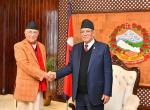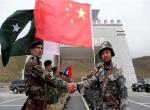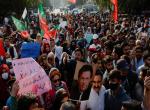Never, since the 1971 War debacle, has the self- image and public perception of the Pakistani Army reached such a nadir. Operation Neptune Spear – the killing of Osama Bin Laden in Abbottabad, turned the spotlight on Pakistan’s amazing duplicity or astounding incompetence. Initially the Pak Army was in a painful cleft about which facet to plead guilty to. Both were equally damning and put Pakistan between a rock and a hard place. For 36 hours after the raid there was a stunned official silence in Islamabad. The Middle East hardly noticed Bin Ladens passing. The sole country that experienced a strong back lash to the killing of Bin Laden was Pakistan . There was a spate of suicide bombings and terrorist attacks that culminated in the daring Taliban raid on the Naval Base at Mehran, where Pakistan’s Navy lost its two Prized Orion Maritime Recce aircraft – the Crown Jewels of its Naval aviation fleet.
The high-strung Talibani reaction against the Pakistani armed forces, clearly sprang from a sense of outrage and betrayal. They had put Sheikh Osama Bin Laden, Mullah Omar, Haqquani, Hekmatyar and other top Taliban leaders in the safe keeping of Pakistan’s ISI. The killing of Laden was, for the Taliban, a monstrous sell out. The fact that the Pakistani Army itself was shell-shocked by the American raid , meant nothing to them. It is preposterous to suggest that the Pakistani Military- ISI complex had no clue for five years that Bin Laden was ensconced in the cantonment of Abbottabad. Some curious details have emerged since then. Bin Laden came to Abbottabad when Lt Gen Nadeem Taj was Commandant of the PMA(Pakistan Military Academy) Kakul, which is located in this town. Gen Taj had earlier helped stage the coup for Musharaf. In 2005 itself , Maj Gen Faisal Alvi, head of the SSG, had apparently complained to Gen Musharraf about Gen Taj’s tie up with Bin Laden. He was shortly sacked from the Army and then killed. Taj went on to become DG of the ISI and masterminded the Mumbai and Kabul Embassy attacks. He was subsequently removed under American pressure and then retired recently as Adjutant General of the Pak Army. The outrage amongst the Taliban stems from its deep sense of betrayal at the killing of Bin Laden whom they had entrusted to the ISIs security. The Pakistani rank and file in turn is deeply offended that the Americans could pull off such a raid so deep inside Pakistan. It has opened them to a spate of ridicule from the civilians. There are rather uncharitable SMS jokes circulating in Pakistan and newspaper columnists have openly been calling the Pakistani Generals “duffers”. The Pakistan Army regards itself as the sheet-anchor of the State and the guardian of its ideology. This ridicule has deeply wounded its amour de propre and its highly exaggerated sense of pride as the only functional institution in the dysfunctional state of Pakistan.
The level of discontent, post Abbottabad and Mehran, has now reached serious proportions. Apparently enraged enlisted men have demanded that Gen Kayani and Gen Pasha must step down. The real Centre of power in Pakistan is the Collegium of the 11 Corps Commanders. It was this collegium that had finally shown the door to Pervez Musharraf. The seniority difference between Gen Musharraf and his Corps Commanders had been substantial and had grown over the decade long period of his rule. By contrast the seniority difference between Kayani and his Corps Commanders is marginal and he is far more susceptible to peer group pressure. The Corps Commanders are apparently furious with Gen Kayani. Kayani has been the Army Chief since 2007. Today he faces intense discontent over what is seen as his cosy relationship with the Americans. The anger of the Lt Generals intensified when Kayani (with apparent US backing) got himself a three years extension. This torpedoed the promotional prospects of 27 Lieutenant Generals of the Pakistani Army and has added to their sense of outrage. Post Abbottabad, at the Corps Commanders conference, they informed Kayani of the deep sense of outrage amongst the enlisted men and junior officers. They apparently suggested that he talk to the men himself before the situation went out of hand. Accordingly, a panicked Kayani started a whirlwind tour of the military cantonments to meet the officers in town hall type meetings. These tours started with the garrisons of Rawalpindi, Kharian and Sialkot. By now Kayani has addressed over a dozen such military gatherings in the cantonments and training Institutions like the NDC. Question hours slated to be for an hour extended up to three hours in some cases. The Military press briefs described them (tongue in cheek) as “very frank”. This is an unprecedented situation in a disciplined army where the Chief feels compelled to explain his conduct to his men. An alarmed Kayani has, in response to this unnerving feedback, hardened his stand with the Americans on all issues. Some 140 US trainers have been sent back and apparently the food and water supplies to the US Drone base in Pakistan have been cut. The five Pakistanis (including a retired major of the Medical Corps) who gave information to the CIA about Bin Laden, have been arrested. So much for the war on terror! There are speculations that gory details of the anger in the Army have been put in the Pakistani media to pressurize the Americans into not insisting upon operations in North Waziristan or for action against top Al Quaida and Taliban leaders hiding in Pakistan.
These are the long overdue consequences of the schizophrenic policy that Pakistan has been following since 9/11. It is noteworthy that Gen Zia Ul Haq had not only thoroughly radicalized the Pakistani Army and ISI, he had equally radicalized the school curriculum to extol Jihad. The motto of the Pakistan Army was changed to “Iman, Taqwa, Jihad fi Sabilullah” (Integrity, Steadfastness and Jihad in the Path of God). Having systematically been fed on a diet of radical Islam and virulently anti- American world views, the entire population of Pakistan is now amongst the most radicalized in the world. Pakistan’s 45,000 Madrasas have become a Jihad factory feeding fanatical recruits and suicide bombers for the global Jihad. Bin Laden and his men have become the icons of the Pakistani youth. The killing of Salman Taseer and its aftermath ,showed how widespread the extent of radicalization has become in Pakistan. The Zia Bharti (the officers who joined the Army in Zia Ul Haq’s time) have reached the rank of Maj Gens and some of them have recently become Lt Gens. They rose because of their Islamic credentials and radicalized outlook. Post 9/11, Musharraff was frightened into a neat volte face by the Americans. By 2005 however, the Americans had pulled out their troops from Afghanistan to fight a meaningless war in Iraq. Musharraff and his cohorts felt that was the end of the American Afghan War and they prepared for the end game by now playing the Taliban card to acquire strategic depth in Afghanistan. This was when Bin Laden and the Quetta, Haqquani and Hekmatyar Shooras were given shelter by the ISI. It was a too clever by half stratagem. The Americans are now not withdrawing in bulk till 2014 at least and Pakistan is hoist with its own petard. The indiscriminate proliferation of small arms via the arming of its Jihadi militias has undercut the very foundation of a modern nation state in Pakistan. The final denoument is now only a matter of time.
Pakistan has swindled America of $ 20 Billion for the Global War on Terror. Yet America is virulently hated today by the Pakistani Army rank and file and the people in general. The stratagem of acting only against the Pakistani Taliban that had turned rogue (while carefully husbanding its Afghan Taliban, LET and JEM strategic assets) has back fired very badly now. The New York Times said, “Kayani is fighting to survive the growing discontent of his corps commanders. Army Chief since 2007, he faces intense discontent over what is seen as his cozy relationship with the Americans and a Colonels coup, though unlikely, was not out of the question”. The Washington Post concurred, “Kayani is fighting to survive and was under pressure to appease his corps commanders who have turned highly anti-American after the raid. They have been demanding that he adopt a much tougher line with the Americans, even edging towards a break”. Kayani even packed off his Prime Minister to Beijing to secure an alternative Chinese alliance. The Chinese have responded with rhetoric but refused to accept Gwadar as a Naval Base and are clearly concerned over stability- particularly in Baluchistan and now throughout Pakistan in general.
Gen Kayani’s problems have been magnified by a ground swell of unprecedented criticism by the public and the media. Post Mehran, the intrepid coloumnist Shazad had exposed the infiltration of the Armed Forces by Jihadi elements. He was killed for his expose. Atish Taseer, the son of the slain governor writes, “The birth of a Terrorist State would not be defined by anything as distinct as a Jihadist coup but by an infiltration so deep that it would soon be difficult to know where Pakistan began and terrorism ended”.
Will there be a Colonels Coup in Pakistan? Unlikely. It is the Collegium of Corps Commanders that usually ushers in the non linear changes (usually in the form of institutional coups). Most of the non-institutional and non-formal coup attempts that failed in the past however, have been led by Maj Gens (like Maj Gen Akbar Khan and Maj Gen Zahir Islam Abbassi etc.) .The creeping radicalization of the Pakistani rank and file however is now cause for acute concern. Post Mehran, it puts serious question marks on the safety of Pakistan’s nuclear arsenal. Above all, this radicalization via deep infiltration could presage the emergence of a Jihadi State. Bruce Reidel has described this as the worst nightmare for America. In his book “Deadly Embrace: Pakistan, America and the Future of Global Jihad”, he writes “A Jihadist Pakistan would be the most serious threat the US has faced since the end of the Cold War”. Aligned with Al Qaida and armed with nuclear weapons, it would be a global security nightmare. American options would range from the “bad to the worse”. It would be prudent for India to wargame likely collapse scenarios and draw up a range of options. Peace talks with such a rapidly failing state that is fast getting radicalized beyond a point of rational no-return, unfortunately make little sense at this stage.
----------------------------------------
Published Date: 23rd June, 2011








Post new comment